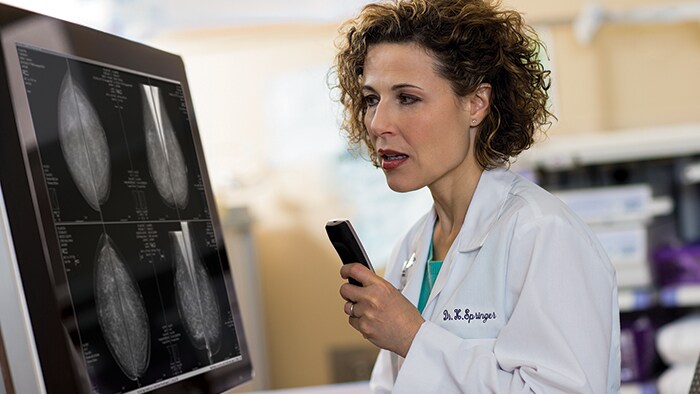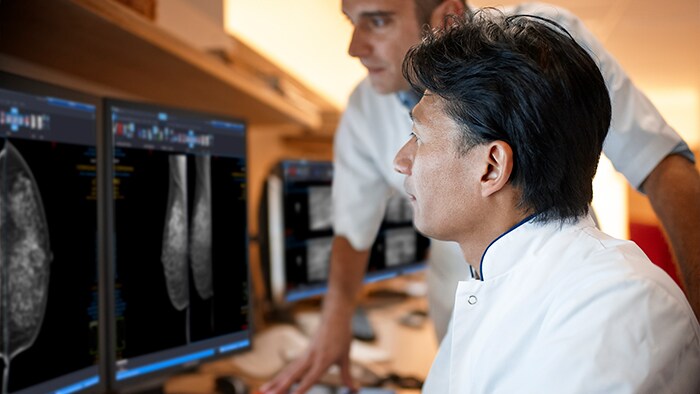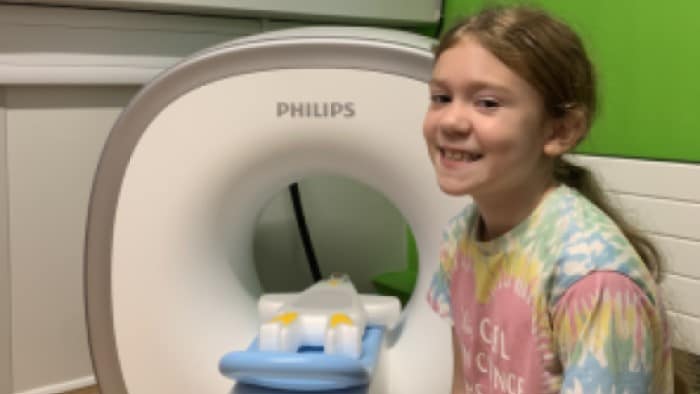Feb 15, 2022
Improving access to care with the world-leading Scottish Breast Screening Programme
Farnborough, United Kingdom – Royal Philips (NYSE: PHG, AEX: PHIA) - A partnership between Philips UK and Ireland and NHS National Services Scotland to deliver the Scottish Breast Screening Programme (SBSP) has become a world-leading model [3] for breast screening. Breast cancer is the most common cancer in women and according to NHS Scotland, nearly 1,000 women per year die from the disease in Scotland [4]. Through the partnership, as many as 270,000 women [5] in Scotland between the ages of 50 and 70 are invited for screening each year [6], leading to the prevention of approximately 130 deaths per year [7]. With large falls (down 19%) in those diagnosed at the early stages of breast cancer during the height of the pandemic (April 2020 – December 2020) [8], down 35% at stage 1 and 15% at stage 2 according to Public Health Scotland (PHS) [9], the SBSP will help Scotland address its backlog by diagnosing cancer earlier.
Improving access to care and enhancing interoperability
The SBSP consists of six static screening Centres in Glasgow, Edinburgh, Ayrshire, Dundee, Aberdeen, and Inverness and 19 mobile units across the country. Approximately 1.15 million people - or one fifth of Scotland’s population - are based in rural areas, potentially living several hours from one of the six Centres. SBSP’s mobile vans enable easier and more affordable access to screening services for those living in rural areas, who often incur higher transport and living costs, particularly when traveling to a major metropolitan hospital [10]. Instead, patients can visit any mobile van location and have their images securely transferred back to one of the nation’s six screening Centres for analysis. The reporting mechanism between SBSP screening Centres means there is also the ability for Centres to provide support for each other in the case of staff shortages.
The national reporting function enabled by the Global PACS solution allows Centres to report and support each other. For instance, in the case of a staffing issue due to absences from sickness amongst readers, cases for reporting can rapidly pile up. The use of this function allows readers from across Scotland to provide mutual aid and assistance in ensuring all Centres are at a similar level in reporting.”
Dr Gerald Lip
Clinical Director of NE Scotland Breast Screening Service for NHS Grampian
Jason Barron, Philips UK&I Enterprise Diagnostic Informatics Manager, said: Scotland leading the screening charge Philips Vue PACS V12.2 – a digital picture archiving and communication system – has been installed across the network to provide national access to breast imaging via a Global Worklist, alongside Symptomatic Services and the national PACS solution. With Philips support, NHS National Services Scotland and the SBSP has created a globally recognised imaging database that has led to improved screening analysis, workflow efficiencies and ultimately, delivered better patient outcomes. For more information about the Scottish Breast Screening Programme, please visit: https://www.nhsinform.scot/healthy-living/screening/breast/breast-screening
“The Scottish Breast Screening Programme has revolutionised breast cancer care in Scotland, ensuring that no matter where patients live, they have a better chance of receiving an early diagnosis and timely treatment. Philips is proud to be working with the team at NHS Scotland to continually improve the technology, scope and scale of the programme.”
Notes to Editors There is a radiologist supply shortfall in Scotland, compounded by long lead times for training both radiologists and advanced practitioners. Currently, images are reported by two trained image readers, with specific training in mammography, who are required to meet performance criteria of the SBSP for both detection and recall rate. Given the repetitive and high-volume nature of mammographic reporting, there is the potential for AI to maintain or increase cancer detection rates without increasing recall rates. At this time, AI has not been approved for use within the national breast screening programmes. Within the SBSP, a research study is underway that will inform the UK National Screening Committee decision on whether AI can be adopted, but the timeframe for this is still unclear. Critically, Philips’ technology enables health services to take advantage of AI screening, which can add a layer of qualification to the image screening process, reduce variation in analysis and provide radiologists with an essential second opinion. The net result may be increased capacity to see, screen and provide results to patients, whilst helping the NHS to tackle the significant backlogs created by COVID-19. Dr Gerald Lip said:
Looking ahead: Using Artificial Intelligence (AI) to improve accuracy and efficiency in breast screening
“This will ultimately benefit women by providing faster results turnaround, relieve pressure on the workforce and reduce inequality providing a benefit to the entire population from the urban Centres to rural regions due to the national PACS solution providing a common interface for the algorithm.”
[1] https://www.nhsaaa.net/services-a-to-z/breast-screening/ [4] https://www.nhsinform.scot/healthy-living/screening/breast/breast-screening [5] Within this communication, the terms ‘woman’ & ‘women’ are used. However, this is inclusive of and recognises that people from different communities can also be invited to the breast screening programme. [6] https://www.isdscotland.org/Health-topics/Cancer/Breast-screening/ [7] https://www.nhsaaa.net/services-a-to-z/breast-screening/ [10] https://www.gov.scot/binaries/content/documents/govscot/publications/research-and-analysis/2017/02/scottish-index-of-multiple-deprivation-rural-deprivation-evidence-and-case-studies/documents/rural-deprivation-an-evidence-review/rural-deprivation-an-evidence-review/govscot%3Adocument/rural%2Bdeprivation%2Bevidence%2Breview.pdf
[2] https://publichealthscotland.scot/publications/cancer-staging-data-using-2018-to-2020-dce-data-the-impact-of-covid-19/cancer-staging-data-using-2018-to-2020-dce-data-the-impact-of-covid-19/
[3] https://www.isdscotland.org/Health-topics/Cancer/Breast-screening/
About Royal Philips
Royal Philips (NYSE: PHG, AEX: PHIA) is a leading health technology company focused on improving people's health and well-being and enabling better outcomes across the health continuum – from healthy living and prevention, to diagnosis, treatment and home care. Philips leverages advanced technology and deep clinical and consumer insights to deliver integrated solutions. Headquartered in the Netherlands, the company is a leader in diagnostic imaging, image-guided therapy, patient monitoring and health informatics, as well as in consumer health and home care. Philips generated 2020 sales of EUR 17.3 billion and employs approximately 77,000 employees with sales and services in more than 100 countries. News about Philips can be found at www.philips.com/newscenter.
Topics
Contact Details Alice O’Malley Junior PR Manager Philips UKI Email: alice.omalley@philips.com Tel: +447798575373










